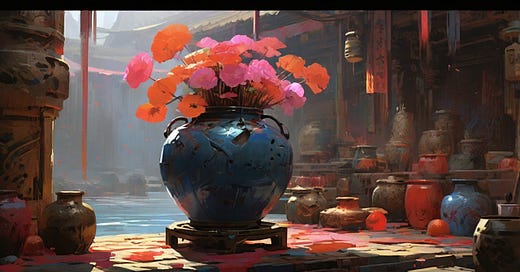The wabi sabi vase (or how to find perfection in imperfection)
Perfection can be found in accepting and celebrating imperfections
Hey there,
I hope you had an imperfect week.
Today, I want to talk about perfection.
In Western societies, we often strive for perfection – whether it's in our appearance, relationships, or accomplishments. We have been conditioned to believe that perfection is the ultimate goal. And anything less is seen as a failure.
But what if I told you that there is also beauty in imperfection?
And that striving for perfection can actually be damaging to our well-being?
In Japanese culture, there is a concept called wabi sabi (侘び寂び).
Wabi sabi is a Japanese philosophy that embraces imperfection, impermanence, and incompleteness. It's rooted in Zen Buddhism and has been ingrained in Japanese culture for centuries.
It sees beauty in things that are imperfect, impermanent, and incomplete.
And this concept can be applied to many aspects of life.
To explain it better, let me paint a picture for you:
Imagine a handmade clay vase with rough edges and an uneven shape. It may not be aesthetically pleasing compared to a perfectly symmetrical and smooth vase.
However, in wabi sabi, this imperfect vase is seen as more beautiful.
Why?
Because it was made by hand, with all its flaws and unique characteristics. It reflects the imperfections of life – the beauty that can be found in our flaws and mistakes.
In contrast, the "perfect" vase (as we know it) lacks character and soul. It's mass-produced and lacks the human touch.
In today's society, we continue to strive for perfection. In ourselves and our surroundings.
We compare ourselves to perfect Instagram models, seek out the perfect relationship, and chase after the perfect job.
But what does this constant pursuit of perfection do to us?
It can create an intense pressure to always be flawless and achieve the unattainable.
We become consumed by self-doubt, fear of failure, and a never-ending cycle of comparison.
But if we embrace wabi sabi – accepting our imperfections and finding beauty in them – we can break free from this damaging mindset.
We can let go of unrealistic expectations and find peace in being imperfectly human.
Instead of striving for perfection, we can focus on growth and progress. We can learn from our mistakes and embrace our unique qualities that make us who we are.
This doesn't mean we should give up on our goals or stop striving for excellence.
It simply means that we should shift our perspective and find beauty in the journey towards our goals, rather than fixating on an unattainable end result.
So next time you feel the pressure to be perfect, remember wabi sabi – and embrace imperfection as a beautiful part of life.
Because often, it's our imperfections that make us perfect.
Weekly Reflection
What is one thing in my life for which I have been striving for perfection? How can I shift my perspective to embrace imperfection and find beauty in it?
🍵 Thank you for reading!
Thank you for allowing me to share my thoughts with you! I hope they bring you a moment of reflection and a touch of peace.
Until next time, stay perfectly imperfect.
– Zhenya
P.S. If you're new here, it's nice to meet you! I invite you to check out the past editions to get a sense of what my Teacup is all about.
🌊 Where can you flow next?
The Way of the Dao: This course is a structured, easy-to-follow introduction to Daoism. It's designed to help you apply its wisdom in a practical way.
My Daoist Mentorship: This is a highly personalized, one-on-one written mentorship. Designed for those who want to step onto a timeless path of self-mastery, inner balance, and effortless flow.





Thank you for this article – it really resonates with me. For a long time, I felt trapped by the need to be perfect, constantly trying to meet the expectations of others – whether it was my parents, society, or relationships. I thought perfection would make me worthy, but instead, it caused anxiety, self-doubt, and a disconnect from who I really am.
Discovering the concept of wabi sabi has been freeing. Embracing imperfection has allowed me to let go of unrealistic expectations and focus on my own journey. It’s a reminder that there’s beauty in flaws, growth, and the lessons life brings.
Thanks for sharing, Zhenya! As a designer, I've learned that creativity is not about seeking perfection, but about embracing openness, curiosity, and the flaws that make our work — and us — authentic.
It's also about adapting to uncertainty and making continuous adjustments through movement in what we do. Great reminder!